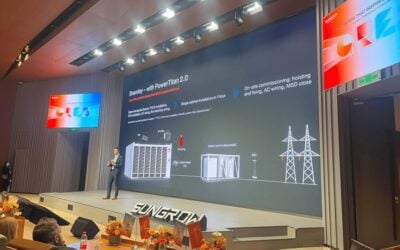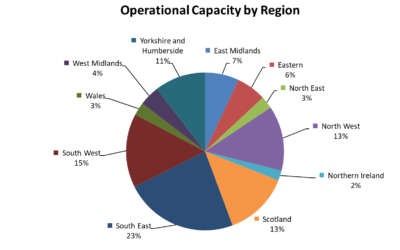
Utility Octopus Energy will pay Gresham House Energy Storage Fund (GRID) a fixed fee to use half of its UK BESS portfolio, at a price which it said is ‘above the current merchant revenue stack’.
Fund manager Gresham House announced the two-year fixed price contract with Octopus today (5 June), which covers 568MW/920MWh of its UK battery energy storage system (BESS) assets, half of its long-term target portfolio of 1,072MW.
Enjoy 12 months of exclusive analysis
- Regular insight and analysis of the industry’s biggest developments
- In-depth interviews with the industry’s leading figures
- Annual digital subscription to the PV Tech Power journal
- Discounts on Solar Media’s portfolio of events, in-person and virtual
Or continue reading this article for free
Octopus Energy will use the BESS projects’ batteries at a price determined by the duration of the assets – expressed in hours – though it excludes Capacity Market payments the projects will receive separately.
Kieran Stopforth, head of flexibility for Octopus Energy, said: “Through this landmark deal with GRID we’re not only increasing the size of our virtual power plant to over 1.5GW, we’re also unlocking the power of flexibility to drive down costs for consumers across the country.”
The tolling agreement and Capacity Market combined mean GRID will have annual contracted revenues of £43 million (US$55 million) over its two-year lifetime. The remainder of GRID’s portfolio will continue to operate in the merchant market under existing agreements with third-party optimisers.
The deal is likely to be the first such tolling arrangement in the UK BESS market, certainly the first of its size, with the vast majority of projects deriving most revenues from merchant opportunities like ancillary services and energy trading via National Grid ESO’s various available markets. However, opportunities in the latter have saturated in the last 12-18 months leading to substantial revenue falls.
John Leggate, chair of GRID, said: “The Board and Manager (Gresham House) firmly believe that the rebalanced mix of contractual and merchant revenues offers shareholders a superior risk adjusted target return and material risk mitigation, particularly in a revenue environment that remains uncertain in the near term, by reducing direct exposure to the Electricity System Operator (ESO) as the principal counterparty in Great Britain.”
The consumer price index-linked (CPI) tolling agreement price, GRID said, is “a higher price than recent weak performance at the start of the year, and at a competitive price for underlying battery economics” and will help the firm to restart paying dividends in 2025.
Discussing the contracts and alluding to what Octopus will use them for, Ben Guest, fund manager for GRID and MD of Gresham House New Energy, said: “They [the contracts] demonstrate the value batteries offer in balancing the supply (power generation) and customer demand that are managed by retail and wholesale market players, in addition to balancing supply and demand at a national level.”
Adding: “End consumers are increasingly demanding electricity that is both renewable and affordable, as well as reliable. Therefore, electricity suppliers increasingly need to balance intermittent, renewable supply with customer demand, for which batteries are well-suited.”
The markets appear to have reacted favourably to the news, with a 16% jump in GRID’s share price at the start of trading today after the news was released.
Energy-Storage.news heard that the UK BESS industry was starting to look more seriously at alternative structures such as tolls at the Energy Storage Summit EU in London in February, with the merchant, third-party optimisation-driven model dominating until now.
Tolls have been used widely in the US, primarily in Arizona and California and to a lesser extent Texas, as well as in the Netherlands by two largest BESS operators SemperPower and Giga Storage.






